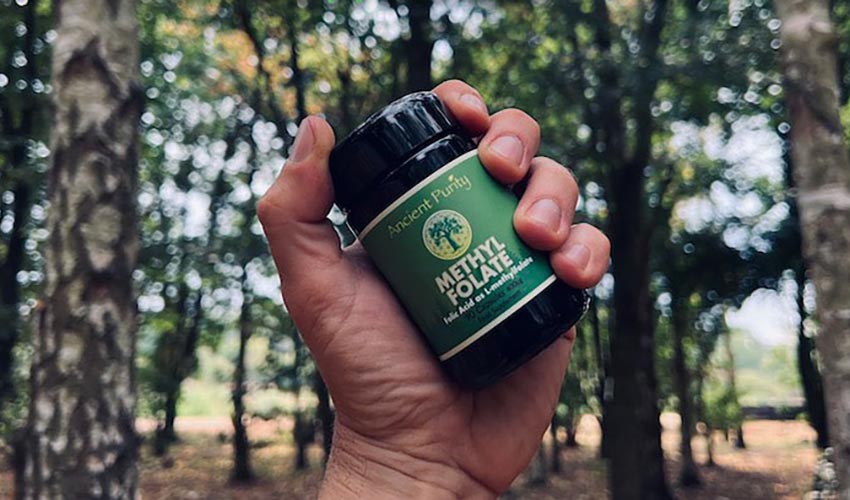Vitamin B1 - A Vital Nutrient Our Bodies Can’t Produce
Today let’s have a closer look at the elusive Thiamine, otherwise known as Vitamin B1. This little powerhouse is essential for your well-being, yet your lazy body can't be bothered to produce it on its own. Nope, you have to go out there and find it in your diet or invest in some cutting-edge food supplements. It's definitely worth the effort because Thiamine is not just your average vitamin. It is more like the VIP of the vitamin world, playing a crucial role in energy production by metabolising glucose. Without it, your body would probably just give up and take a nap. And there’s more! Thiamine is also the unsung hero of nerve health and cognitive function. It's like the brainiac of the vitamin world, making sure your mind is sharp as a tack. Thiamine even helps out your heart by producing the neurotransmitter acetylcholine. It's like the little cupid of your cardiovascular system, keeping everything running smoothly.
And let's talk about digestive health. Thiamine is there for you, helping out with hydrochloric acid production like a trusty sidekick. This essential B Vitamin makes sure your tummy is happy and healthy. In addition, Thiamine is a superhero when it comes to diabetes, helping prevent complications and keeping your immune system in tip-top shape. It's like having a shield of protection against respiratory illnesses, ready to fight off any nasty bugs that come your way. This little vitamin may be small, but it sure does pack a punch! Who knew that a little Thiamine could go such a long way in alleviating symptoms of autoimmune diseases like IBD and Hashimoto’s? Say goodbye to that boring fatigue and welcome to renewed energy!

Thiamine deficiency doesn’t just stop at fatigue. It can also sneak up on you with muscle weakness, poor appetite, digestive issues, brain fog, mood swings, and even eye-related troubles. And if you thought that was bad, just wait until you hear about beriberi. No, it’s not a fancy Italian dish, but rather a serious condition that can wreak havoc on your body if left unchecked. From neurological issues to cardiovascular problems to severe brain dysfunction, beriberi is no joke. So, why not give Thiamine supplementation a shot? Your body will thank you, and who knows, you might just become the life of the party with all that newfound energy!
Health-Enhancing Properties of Vitamin B1
Healthy Immune Function
This powerhouse nutrient plays a vital role in boosting our body's defences against germs and viruses. Think of it as the bouncer at the club of your immune system, making sure only the bad guys get kicked to the curb. Without enough B1, your immune system is essentially throwing a party with the door wide open for troublemakers. So, next time you're feeling under the weather, remember to show some love to Vitamin B1 and give your immune system the backup it needs to keep you feeling your best.
Digestive Health
Thiamine is often overlooked but oh-so-important as it plays a vital role in our digestive system. It's like the unsung hero quietly working behind the scenes to ensure we properly digest our food. Without enough Thiamine, our bodies wouldn't be able to produce enough hydrochloric acid, the digestive powerhouse that breaks down our meals and allows us to absorb all the good stuff. So, let's give Thiamine the credit it deserves for keeping our digestion on point and our bellies happy.
Cognitive Function
Regarding cognitive function, I would like to describe Thiamine as our brains’ little energiser bunny, ensuring its cells have the fuel they need to keep chugging along smoothly. Just like how a cup of coffee can give you a little brain boost in the morning, Thiamine gives your brain cells that extra kick of energy they need to function at their best. Think of it as the brain's personal trainer, making sure it stays in tip-top shape and doesn't start slacking off as you age. It's like the secret sauce for a healthy brain, particularly for those seasoned adults who want to keep their mental faculties sharp and ward off the dreaded Alzheimer's disease. So, if you want to keep your noggin' in top form and avoid those memory lapses, make sure you're getting enough Thiamine in your diet.

Nerve Function
Thiamine is a great help to combat stress and keep your central nervous system in tip-top shape. It's like the knight in shining armour for your nerve cells, ensuring they stay healthy and your nervous system runs like a well-oiled machine. But beware, for a lack of Thiamine can lead to some serious consequences. Just ask ALS patients, who are running on empty with Thiamine levels 60% lower than they should be. Their brains and nervous systems are struggling to metabolise glucose, causing some major roadblocks in their bodies. There may be a glimmer of hope in the form of Thiamine and biotin. These dynamic duo vitamins have shown promise in helping to reverse the effects of Huntington's disease by kick-starting glucose metabolism back into gear. So next time you reach for that Full Spectrum Vitamin B Complex, make sure Thiamine is on the ingredient list.
Energy Production
Thiamine is like the quarterback of the body's energy production team, leading the charge in breaking down glucose to create the much-needed fuel for our everyday activities. Without Thiamine, the Krebs cycle - the MVP of energy-producing pathways - would be left in the dark, unable to efficiently convert proteins, fats, and carbs into the powerhouse energy we need to tackle the day. So cheers to Thiamine, the unsung hero keeping our bodies fuelled and ready to go!
Prevention of Diabetes Complications
Research shows that Thiamine can help people with diabetes by standing guard against oxidative stress and even potentially boosting glucose tolerance.
Heart Health
With regards to heart health, Thiamine's true magic lies in its role in producing acetylcholine, the ultimate matchmaker between nerves and muscles. Without this neurotransmitter, our hearts would be lost in a sea of missed connections. So, next time you feel your heart aflutter, give a nod to Thiamine – keeping healthy hearts healthy.
The Silent Threat - How Thiamine Deficiency is Flying Under the Radar
You might think Thiamine deficiency is just for those who have a few too many alcoholic drinks or forget to eat their veggies, but think again! Recent research suggests that vitamin B1 availability is on the decline throughout the food chain, making it harder for all of us to get our daily dose of this crucial nutrient. Adults should aim for 1.2 mg of Thiamine per day, but with plants and wildlife also facing a Thiamine crisis, it’s no wonder that more and more of us might be falling short. The thing is, we don’t really have solid stats on just how widespread the issue is in the U.S. population. So how do you know if you’re getting enough Thiamine? Well, you could whip out a calculator and crunch some numbers, or simply keep an eye out for the tell-tale signs of deficiency. Considering how important Thiamine is for keeping your body running smoothly, it’s worth taking a closer look at your diet – and maybe giving those leafy greens a little extra love. Let’s face it! We all deserve to be Thiamine-rich, right?

Are You Getting an Adequate Amount of B Vitamins?
Forget playing a dangerous game of Thiamine roulette with your body - did you know that a deficiency can sneak up on you in as quickly as 2 weeks? With a half-life of only nine to 18 days, Thiamine doesn't mess around. So, why not play it safe and opt for a top-notch food-based supplement that boasts a variety of B vitamins to keep things in harmony? And hey, if you're not into imbalance or deficiency (who is, really?), here are some nifty guidelines to make sure your thiamine status stays on point:
- Avoid Drinking Too Much Alcohol… They say too much booze can mess with your B vitamin game, making it harder for your body to soak up all that lovely Thiamine. And let's not forget about those sneaky diuretics - they'll have you running to the bathroom so much, you could end up flushing thiamine right down the drain. So, remember, a little moderation goes a long way when it comes to keeping those essential nutrients in check.
- Consume Fermented Food… Forget popping pills, the key to unlocking the power of the B vitamins lies within your gut - literally. Your body's very own internal vitamin factory resides in your microbiome, but it needs some quality raw materials to work its magic. So, ditch the processed junk and load up on real, organic foods that will nourish your gut like never before. And don't forget to throw in some fermented goodies too, because nothing says healthy gut like a little probiotic party. Trust me, your insides will thank you as they pump out all the B vitamins you could ever need.
- Correct a Suspected Magnesium Deficiency… Without magnesium, Thiamine might as well pack up its bags and leave the conversion party early. This essential mineral plays a crucial role as a wingman in the process, making sure Thiamine doesn't pull any disappearing acts before the transformation is complete. So, next time you're marvelling at the seamless conversion of Thiamine, remember to give a nod to magnesium for keeping things running smoothly.
- Try not to Consume Sulphite-Rich Drinks & Foods… Watch out for sneaky sulphites lurking in non-organic processed meats, wine, and lager! These villains have anti-thiamine effects that can put a damper on your day.
Recommended Daily Intake
Thiamine (B1)… So, apparently adult men and women need 1.2 and 1.1 mg of thiamine respectively every day. But wait, there's more! If you start experiencing some funky symptoms of thiamine deficiency, you might need to up your dosage a bit. And don't worry as Thiamine is like the star of vitamins - water-soluble and nontoxic, even if you take a boatload of it. I'm talking doses as high as 3 to 8 grams per day have been used to treat Alzheimer's, and nobody burst into flames or anything. So, go ahead and give that Thiamine the love it deserves, just don't go too crazy with it, okay?
Riboflavin (B2)… The recommended daily intake is around 1.1 mg for females and 1.3 mg for males.
Niacinamide (B3)… Are you feeling a little low on energy lately? Well, it might be time to give your body a little boost with some Niacinamide, also known as vitamin B3. Researchers over at the Food and Nutrition Board suggest getting at least 14 to 18 mg of this goodness each day, but we here at Ancient Purity like to up the ante a bit. We recommend a solid 50 mg of Niacinamide, 3 times a day, to really get those energy levels soaring. Why Niacinamide, you ask? Well, not only does it play a crucial role in energy metabolism, but it also acts as a precursor to NAD+, a key player in converting food to energy, maintaining DNA integrity, and keeping your cells functioning at their best. Learn More About Niacinamide Here.
Vitamin B6… Calling all health-conscious people! Nutritional yeast, the unsung hero of B vitamins, is here to save the day. Move over Brewer's yeast, there's a new player in town. Packed with nearly 10 mg of vitamin B6 in just a mere 2 tablespoons, this powerhouse is leaving the recommended daily intake in its dust at 1.3 mg. Say goodbye to deficiency and hello to nutritional yeast – your new favourite source of essential nutrients.
B8 (inositol/biotin)… The mysterious and elusive Vitamin B8. Despite not being crowned as an essential nutrient (you won't find it on the VIP list), rumour has it you should aim for around 30 mcg of this nutrient each day. Vitamin B8, also known as Biotin in the supplement world, can be your best friend in the quest for radiant health. So, where can you find this elusive B8? Look no further than that trusty old brewer's yeast - nature's little secret weapon for boosting your B8 levels.

Folate (B9)… Folic acid is a synthetic type of B vitamin used in supplements; Folate is the natural form found in foods. (Think: Folate comes from foliage, edible leafy plants.) For folic acid to be of use, it must first be activated into its biologically active form (L-5-MTHF). This is the form able to cross the blood-brain barrier to give you the brain benefits noted. Nearly half the population has difficulty converting folic acid into the bioactive form due to a genetic reduction in enzyme activity. For this reason, if you take a B-vitamin supplement, make sure it contains natural Folate rather than synthetic folic acid. Nutritional yeast is an excellent source. Adults need about 400 mcg of Folate per day. Learn More About (L-5-MTHF) Folate Here.
Vitamin B12… Are you a veg head or a herbivore looking to up your B12 game? Look no further than nutritional yeast seasoning - the holy grail for all you plant-based eaters out there. With a whopping 67 mcg of natural vitamin B12 in just 2 measly tablespoons, this stuff packs a punch like no other. But wait, that’s not it! If you're not into sprinkling yeast on your food like fairy dust, fear not. Sublingual fine mist sprays or good old fashioned vitamin B12 injections are here to save the day. These bad boys allow that big old B12 molecule to slip directly into your bloodstream, ensuring you're getting all the good stuff without any fuss. Learn More About Vitamin B12 Here.
“Vitamin B proved to be not one vitamin but several, which is why we have B1, B2, and so on. To add to the confusion, Vitamin K has nothing to do with an alphabetical sequence. It was called K because its Danish discoverer, Henrik Dam, dubbed it “koagulations viatmin” for its role in blood clotting.” - Bill Bryson






















